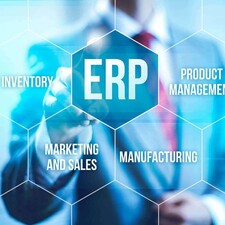Blog
4 Most Important Functions of ERP Electronics Manufacturers Demand

Summary
The ERP electronics manufacturers will most benefit from must deliver operational excellence, safety, speed, and optimized costs.
These factors will never fall out of favor with electronics and parts manufacturers as they develop groundbreaking technology, hit demands precisely and conduct business with their many vendors and subcontractors.
But with each passing consumer or industry trend, electronics manufacturers must continuously add to its list of what matters most. We believe, however, the right ERP system for them acts as the foundation for instituting and organizing in accordance with best practices and companies' individual values.
Here's our list of functions that electronics manufacturers can't live without - and how ERP can help bring them to plants everywhere:
1. Buying power through sales forecasting
The right ERP system for electronics manufacturers acts as the foundation for instituting and organizing in accordance with best practices and companies' individual values
When electronics manufacturers have a better understanding of their sales, they make smarter decisions about production and purchasing. It's all linked, but it starts with accurate, actionable sales forecasting.
Source too little and production will freeze until teams acquire the missing parts. Source too much and the business overextends its cash flow. With the right ERP in place, manufacturers can derive parts quantities from sales figures and take advantage of price breaks more often.
2. Totally transparent inventory management
It doesn't take a veteran of the electronics manufacturing industry to understand the trouble with managing large volumes of small components as they undergo fast assemblies. As previously stated, an ERP system that promotes intelligent procurement practices based on real-time demand and turnover rates will drive long-term cost savings and mitigate risks associated with parts overages and shortages.
The benefits continue when one adds inventory management capabilities to forecasting. ERPs protect sensitive electronic components with process visibility. Users know how parts are organized and the justifications for each replenishment quantity, thus limiting the amount of excess physical stock on site and leveraging inventory management resources efficiently. Smaller volumes mean a smaller chance of damaging parts.
Consider the benefits to prototyping as well. If the parts placed into a prototype were damaged because of poor inventory management, what are the chances that that sample will develop into a full-fledged product? In all three cases, ERP-powered inventory processes help electronics manufacturers reduce the risks to their parts that dog them the most.
Is your electronics plant getting the real deal or a raw deal? Find out with advanced lot control.
3. Protection from fakes and flaws
High consumer demand for fast development cycles, the value of risk diversification among multiple vendors, geopolitical influence on international economies - complexity in the electronics supply chain has many causes.
Unfortunately, in attempting to manage the reliability of supplier and sales channels stretching around the world, the electronics industry has succumbed to a great deal of intellectual property theft and counterfeiting. In total, IP theft costs the U.S. economy an estimated $600 billion annually, according to The New York Times.
IP theft costs the U.S. economy an estimated $600 billion annually
Comprehensive ERP solutions with web-based vendor portals serve as a frontline defense against furthering fake parts along supply chains and into the market. In these systems OEMs can establish approval lists based on current regulations and incorporate necessary compliance documentation directly into the interface. As laws and standards shift, either internally or externally, manufacturers can update requirements, ensure their adherence and part ways with vendors who elect not to keep up with the times.
Furthermore, ERP systems with integrated lot control management allow electronics producers to track components with greater detail throughout the supply chain. If evidence of counterfeiting or defective parts arises, teams can draw lines back to bad batches, then investigate where upstream the problems originated and identify which of their distribution channels they sent similar compromised goods. Given how many components electronics manufacturers manage and how often they turnover their inventories, ERP-integrated lot control is a boon to both regulatory compliance and brand image.
4. Version/revision control
No industry knows more about the speed of innovation quite like electronics manufacturing. When an engineering change order is handed down from on high, businesses must adapt to improve their offerings, ensure ongoing operational excellence or debug issues they've discovered.
There is obvious value in creating a living record of the most up-to-date production recipes, current product specifications and all past iterations of both - what's known as version or revision control. But how an electronics manufacturer employs versioning ultimately dictates what it gets out of the process. Good version control requires a platform for easy access to historical documentation, seamless collaboration in real time and a strategy in case of conflict. For those series electronic manufacturers in need of comprehensive product lifecycle management, an ERP system with Production Planning and Control and CAD integration can be that platform.
Additionally, manufacturers that provide custom products will want an ERP system such as abas ERP that can integrate with third-party configuration software end to end and automate the production of anything from invoices to Bills of Materials.
Both native and cloud ERP products from abas offer these core functions and more. For further information, read up on how abas ERP serves the industry building our digital future one semiconductor at a time.


